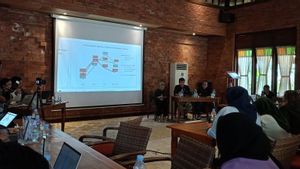JAKARTA - Professor of the Faculty of Psychology, University of Indonesia Prof. Dr. Mirra Noor Milla said about the importance of social psychology in understanding acts of terrorism.
"This radicalization process is also shown to have a psychological basis in every stage," said Mirra Noor in Depok, Sunday, quoted by Antara.
This stage, he said, was through a process motivated by the need to obtain self-significance through identity transformation, then strengthened in the group process to serve the sole goal of fulfilling the meaning of themselves and their groups.
According to Prof. Mirra, terrorism is a complex phenomenon and requires understanding across disciplines, including psychology, especially social psychology.
This science presents a framework of analysis, both at the individual and group levels, to explain why and how individuals engage in acts of terrorism. Many social experts describe terrorism as a gradual process of radicalization.
In explaining radicalization, added Prof. Mirra, there are three components, namely the need that motivates individuals, the ideological narrative that justifies, and groups or social networks that validate.
Explanation of the radicalization stage needs to be reviewed in explaining online radicalization, considering that in the era of digital information, the radicalization process has become faster and includes increasingly diverse groups of individuals.
Therefore, continued Prof. Mirra, the explanation of personal factors has relevance to better understand how radicalization occurs when the role of a limited group.
"For this reason, understanding the radicalization process is the key to detailing possible deradicalization pathways that can be taken," he added.
He added that the evaluation of the effectiveness of terrorist rehabilitation programs in various countries shows diversity and has not yet reached a definite conclusion. The main challenge lies in the nature of extreme ideological beliefs that are difficult to change.
However, several programs have shown progress and potential success. The combination of counter-ideology programs and psychological support programs is the most promising to date.
SEE ALSO:
According to him, the difficulty in shifting or changing extreme beliefs that are motivated to direct the relevance of prevention efforts is by breaking the chain of radicalization for individuals who are vulnerable before exposure and engaging in acts of extreme violence.
"In addition, by strengthening individual resilience to the propaganda of extremism and radicalism," he said.
At the community level, prevention can be realized through efforts to avoid polarization between groups, considering that polarized communities can fertilize the spread of extreme narratives and become potential risks for vulnerable individuals.
The English, Chinese, Japanese, Arabic, and French versions are automatically generated by the AI. So there may still be inaccuracies in translating, please always see Indonesian as our main language. (system supported by DigitalSiber.id)












